- Home
- Nnedi Okorafor
Ikenga Page 14
Ikenga Read online
Page 14
The Chief was calm as he watched Nnamdi closely.
“You have your father’s eyes,” he said, suddenly looking very serious and grave.
Nnamdi said nothing. He could smell it on the Chief: the fierce control, confidence, and certainty in his actions. He could see why this small man was able to control so many corrupt people.
“Why would I want to kill your father?” he asked in a soft voice.
Nnamdi blinked, even more confused. Not “I didn’t kill him,” but “Why would I want to kill him?” The question was so odd that Nnamdi stepped back. Slowly, he sat down in a nearby chair. All the tension left his body. He felt so tired. “What?” Nnamdi asked.
The Chief opened a drawer on his side of the desk and brought out a chewing stick. Nnamdi shivered. His father loved chewing sticks, too. And he did the same thing; he kept a whole bunch in his side drawer. The Chief put his chewing stick between his lips and began to chew while watching Nnamdi.
Nnamdi could feel the Man just under his skin, trying to push forward again, muddling his brain and swelling his appetite for violence. He strained, holding the Man back.
“What is eating you?” the Chief asked.
Nnamdi closed his eyes and shook his head.
“Nnamdi, I did not kill your father.”
Nnamdi opened his eyes. The Chief continued munching on his chewing stick and settled back in his chair. “Your father and I . . . we were childhood friends.”
“Liar,” Nnamdi spat. “My father—”
“Shut up and listen,” the Chief snapped, clasping his hands in his lap. “You came here for a reason, that’s clear. I will give you something better. Listen first and then decide what you want to do.”
Yes, which will be to kill you, Nnamdi thought, his eyes burning with tears.
“Your father and I knew each other since we were little boys. We grew up on the same block, our mothers were best friends, and our fathers worked in the same insurance office. And we always had the same taste for justice.”
He picked another chewing stick from his drawer and threw it at Nnamdi. It landed right in Nnamdi’s lap. “Chew, it will calm you down. It’s a habit your father taught me.”
Nnamdi felt light-headed as he looked down at the chewing stick. A memory popped into his head. He had earned a poor grade on a math test and, not wanting to sit and wait all evening for his father to come home and punish him, he’d gone to see his father in his police station office. He’d sat in the chair across from his father while his father looked at the math test. Nnamdi hadn’t studied and this was the result. His father had frowned, opened a desk drawer, and taken out a chewing stick. He chewed and chewed for several minutes before looking up at Nnamdi and calmly saying, “This is the worst thing I’ve ever seen. I don’t want to see anything like it again.” From that point on, Nnamdi had always earned strong grades in not only math classes, but all his classes.
Slowly, Nnamdi picked up the chewing stick the Chief had thrown at him. He placed it in his mouth and started chewing.
“Your father and I were born with it, that taste for justice,” the Chief repeated. “We wanted to leave the world a better place than when we came into it. Even from a young age we felt this way. But when we grew up, well, we chose different paths. He took the high road into the police department and I took the low road into the underground, trying to solve, or at least control, problems from the inside. But our paths both led to the same place—justice.” He paused. “Nnamdi, I may look like the kingpin of Kaleria’s crime ring, but I’m a revolutionary just as dedicated to helping Kaleria as your father. Corruption is systematic. . . . Your father’s goal was to stamp it out while mine was to channel it as much as I could.”
Nnamdi chewed his stick down to soft splinters and, as the Chief spoke, he threw Nnamdi another one. This one was mint flavored.
“Almost all those people out there, I manage them so at least they are not as bad as they could be. And I am like Robin Hood: I steal from the rich and give to the poor,” he said. “For example, I anonymously donate millions of naira to schools and hospitals. Take that abandoned school building on the other side of town.” He hissed, looking irritated. “That’s one of my greatest failures. Those two American Nigerians in charge of it would not have raised even a wall of that school if it weren’t for me. That was really my project. But I had to let it go when I learned those two planned to convert the school into a town shopping center as soon as it was finished. It was a bad business deal, so I shut it down.”
Nnamdi pressed his fingers to his face, his head beginning to ache. Those American Nigerians were really going to do that? Why? And the Chief stealing from the rich and giving to the poor? This was criminal activity, no matter how honorable he made it sound. But in Kaleria, where even the police department could be corrupt, how else could one make things better? His father had tried in the legal way and he was killed for it.
“Your father was the only uncorrupted person in the department,” the Chief of Chiefs said. “The sheer will of the people got him nominated for police chief, but I had to pay off key people in the department to get him the win.”
Nnamdi felt sick. His father’s election as the chief of police had only happened because of the same corruption he was fighting.
“You don’t agree with my ways,” the Chief said.
Nnamdi hesitated, but then slowly shook his head. “Crime . . . is crime.”
The Chief chuckled and nodded. “You are your father’s son. He never agreed either. Many times he and I argued and threatened each other. He believed wholly in justice and I could never believe that justice could ever be truly served under a corrupt system.” He held up his hand. “But see this ring?”
“Yes,” Nnamdi whispered.
“Your father had one and I have one,” he said. “We bought them together when he entered the police force. We wanted something to help us stay connected since we knew we could not be close friends anymore. He was going to be police and I was moving up in the crime ring. This is the Ouroboros, the serpent eating its tail. It’s an ancient African symbol that means ‘life out of death.’ Kaleria is the Ouroboros, feeding on itself because of its corruption. Aside from dedicating our lives to fight for justice in Kaleria, that was one thing your father and I agreed on.” He laughed.
“One man gives money to build roads; another man eats the money so he can buy a Mercedes. One man gives money to help the schools; another man puts the money into his own bank account and calls the teachers thieves. Your father and I wanted to change this. We just didn’t agree on the method.”
He grew serious and sighed. “Nnamdi, on the last day that I saw him . . . alive, the night before his death, we met. You remember that? They reported it in the newsletter.”
“Yes,” Nnamdi said.
“We made an exchange. The newsletter only reported part of the story. It said that I was going to cooperate with your father to help stop the highway robberies in Kaleria that had gotten out of hand. Really, we were planning to work together to finally cure Kaleria of its corruption for good! I was willing to try. We were going to combine his method and mine.”
“So who killed my father, then, if not you?”
“I am still trying to solve that mystery,” the Chief said darkly. “When I do, that person will be handled.”
* * *
Nnamdi’s head was full as he and Chioma sat in the taxi. Chioma had listened intently as he told her all that had happened and then she said, “Let’s just get out of here.”
Nnamdi agreed. They were no closer to finding his father’s killer, but he’d learned something just as valuable and he wanted to chew on that for a bit, away from the party full of criminals. The Chief of Chiefs wasn’t his father’s murderer; he was nearly his best friend, his closest colleague. Nnamdi leaned back and rubbed his forehead.
They carried large containers of
food—jollof rice with goat meat, fried plantain, egusi soup, and chin chin. Chioma was happy to take the large plastic containers. “We earned them!” she’d laughed. Not only had she stirred her share of stew, rice, and soup, she’d walked all over the party with five trays of suya and chin chin and had even been asked to dance onstage. “It was great!” Chioma had told Nnamdi when he finally found her. Nnamdi was glad she’d at least enjoyed herself, despite the highly dangerous environment.
The taxi dropped them near her friend Onuchi’s house and they parted ways. Nnamdi tapped on Ruff Diamond’s bedroom window and Ruff Diamond let Nnamdi slip into his room.
“Jesus, it’s eleven; I nearly died with worry!” Ruff Diamond said. “I had to watch three movies really loudly so that my mother wouldn’t interrupt us!”
“Sorry,” Nnamdi said.
Ruff Diamond looked him over. “Are you all right?”
Nnamdi nodded. “Just a lot on my mind. We got what we needed.”
“Good,” Ruff Diamond said, climbing back into bed.
“Aren’t you going to ask me what we got?”
“No,” Ruff Diamond simply said. He shook his head. “No.” They paused, looking at each other. Then they both laughed.
Nnamdi lay on his side of Ruff Diamond’s bed and was glad when his friend started snoring. He didn’t think he’d sleep a wink. The Chief of Chiefs was not his father’s murderer? He rolled this question around in his head, replaying their meeting over and over. Each time, he paused to remember the Chief of Chiefs using the chewing stick to think. That was the strongest evidence that he was telling the truth. The fact sunk into him. The Chief of Chiefs was not his father’s murderer. So who is? Nnamdi wondered. And what was he fighting for if Kaleria was so hopeless that the only way to do good and live was to do some bad, like the Chief of Chiefs?
Nnamdi wanted to keep being the Man. He’d decided this as soon as Chioma had found him in the abandoned school and helped him get ahold of himself. But could he simply fight crime in Kaleria? Protect the people of Kaleria with no hope of truly cleaning it up? Simply make things better than they could have been, like the Chief? What if he never found out who shot his father? If even the Chief couldn’t solve the mystery, could Nnamdi do any better? He shut his eyes tightly, his head pounding from thinking too hard about who it could possibly be. He rested his head on his pillow and quickly fell into a fitful sleep, his mind still turning the question over and over. Who shot Daddy?
* * *
As the sun rose, he sat up, realizing something he was sure was profound: He knew exactly who his father’s murderer was. It was the only man he knew who had good reason to want his father out of the way—Bonny, his mother’s boyfriend. Why didn’t I see it before? he groggily thought. It’s so obvious. Without waking Ruff Diamond, he got up, threw his street clothes on over his pajamas, and ran home.
Bonny’s Head
NNAMDI WAS RUNNING.
He ran past houses where men and women polished their shoes outside, preparing for work. He ran past agege bread hawkers who sold bread and cheap butter. He saw everything, but greeted no one. His blood was burning and his head was pounding. He couldn’t speak even if he wanted to. How had he not figured it out earlier?
He had to hurry. Bonny usually picked his mother up and drove her to work these days. Bonny, the man who’d killed his father in order to have his mother all to himself. Yes, it was so obvious. Nothing else made sense. Breathing hard, Nnamdi stopped and, right there in broad daylight on the side of the road, he shifted into the Man. He catapulted off, taking a back road. Not because fewer people would see him, but because it was faster. As the Man, he could quickly scale fences and jump over parked cars.
Bonny was in for trouble. Oh, if he only knew, Nnamdi thought with focused anger. Nnamdi wanted him dead! How could a man kill another man, then turn around and woo the man’s widowed wife? Abomination! Nnamdi’s mind was beginning to cloud. He remembered how his father used to shout abomination! when he told his mother about the latest criminal deed he’d learned about at the police department. Nnamdi’s anger exploded and he ran faster, leaping over two goats standing in the middle of a small path behind a house. Bonny had to die and his mother had to be saved from smiling into the eyes of an evil man, from loving him.
Vaguely, Nnamdi felt tears stinging his eyes and drying on his cheeks as he ran. How did I not see Bonny’s selfish, evil motive? he wondered. I was such a fool! He slowed down when he arrived at the back of his compound. He heard Bonny’s voice inside the gate, near the house. He ran around to the front, where the gate was open, and peeked inside. And there was the devil.
“Ezinne, hurry,” Bonny was saying as he put the last of his mother’s packages in the back of his Mercedes. “I want to buy some buns before I drop these things off!”
It was Saturday and Mr. Oke was off duty. Nnamdi was glad. He didn’t know what he’d do to him if he tried to stop Nnamdi from doing what he was about to do. A fresh pulse of anger shot through his body. He grasped the side of the gate and squeezed. There was a satisfying crunch as the tips of his fingers bit into the metal.
His mother came running out of the house with one last box full of yams. She was wearing the dress Bonny had bought her last week. His mother was growing lax. Now she was accepting more gifts from him. Nnamdi frowned. He frowned deeper as his mother took Bonny’s hand and they both laughed, looking into each other’s eyes.
“Thanks for doing this,” she said. “Tell Fifi that I will join her as soon as my son gets home. She’ll be in charge of the stall till then.”
“That’s what you pay her for,” he said, hugging her close. “I’m proud of you, Ezinne. Your stall is doing so well.”
His mother beamed.
Nnamdi was disgusted. He’d seen enough. It was time to pounce on his father’s killer. Bonny was approaching the open gate, right toward where Nnamdi hid. He was going to push the gate wider. Nnamdi’s sharp eyes narrowed as he calculated how many more steps the murderer had to take before he would grab him. Two steps, one step. Come, Mr. Bonny, Nnamdi thought. Closer and closer to Nnamdi he came. Closer and closer to the Man. Closer and closer to his death.
Nnamdi saw it at the very last moment. A thin white line of smoke surrounded Bonny’s head. He froze as Bonny grasped the edge of the gate and pushed it wider. Then something that had never happened before happened. “Oh,” he whispered. Nnamdi felt rather than heard the low, muffled voice in his mind. It calmly said, “Where there is smoke, there is no killer.”
Nnamdi looked around, but he saw no one. “Who’s there?” The back of his neck prickled. No answer. Then, not far from Bonny as he walked to his car, Nnamdi glimpsed . . . his father’s dashiki, the long flowing robe he wore only on weekends. A near invisible glint of it. His mouth fell open. The cloth grew shadowy and, as Nnamdi squinted to get a better look with his extra-sharp eyes, it vanished. Now Bonny was in his car, waving goodbye to his mother. Nnamdi moved behind the wall so that Bonny wouldn’t see him as he backed out.
The thin white line of smoke surrounded the car now. The gate banged shut as his mother closed it and Nnamdi sat on the concrete, all his power and anger leaving him. He covered his face with his hands. His hands . . . he’d changed back, the Man leaving him like helium from a balloon. “Oh God,” he whispered. He’d nearly attacked an innocent man. Someone his mother cherished. Now that his mind was clear, he felt so ashamed. He’d been so desperate for an answer to his father’s death that he’d thought something terrible about a good person.
Bonny would never have done such a thing. And his mother dating her husband’s killer? She’d never ever be so easily manipulated. Nnamdi had been manipulated, by his own irrational need for justice. Daddy, why did you give me this power? he thought with his eyes closed. Take it away. PLEASE. He wiped sweat from his brow and tried to think. If Bonny did not kill his father, then who had? He wished his father would just tel
l him.
He entered the house, greeted his mother, and went right to his room, hoping and hoping. He opened the pencil case. It was still in there. The Ikenga. His burden. His responsibility. His.
Determination
NNAMDI PACED HIS room, thinking and thinking and thinking. He’d helped his mother bring two huge pots of yam porridge to church for a small baptism celebration and now she was off to her stall. He wished he could go out and have a relaxing Saturday afternoon with friends, too. Ruff Diamond, Jide, Hassan, and some other kids were playing soccer in the field nearby. Chioma was also out there, chatting with some friends. But his mind was too occupied and bothered to allow him to go out and enjoy the nice day.
The Chief of Chiefs had denied killing his father and Nnamdi believed him. He seemed to be far more than he appeared. One day, Nnamdi planned to learn more about the Chief of Chiefs and his relationship with his father. Did his mother know of it? He didn’t think so. The day she saw him at the funeral, she’d looked like she wanted him dead, too. However, before he could fully understand the mystery of the Chief of Chiefs and his father, he had to solve the mystery of his father’s death. The spirit of his father had told him that Bonny was innocent.
So why couldn’t he just tell Nnamdi who did it? “Because Daddy wants me to figure it out on my own,” Nnamdi whispered. “Oh, Daddy, why couldn’t you have given me a super-brain to solve this? Instead, you gave me . . .” He punched his pillow, got up, and trudged to the bathroom. A pink wall gecko stood in the corner near the window. It had nabbed a large mosquito. Nnamdi stared up at it for a moment and then, despite himself, he smiled at the tiny aggressive creature.
“Well done,” he said, chuckling. He turned on the tap and washed his face. The cool water felt good on his burning eyes. He was drying his face, still thinking and thinking, when his mind paused on the word chief. He pressed the towel to his face, rolling the word over in his mind. Over and over.

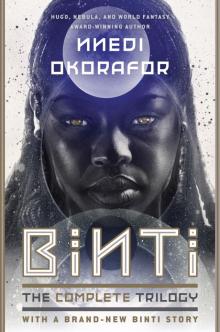 Binti, The Complete Trilogy: Binti ; Home ; The Night Masquerade
Binti, The Complete Trilogy: Binti ; Home ; The Night Masquerade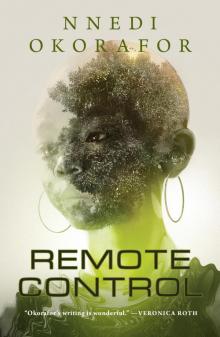 Remote Control
Remote Control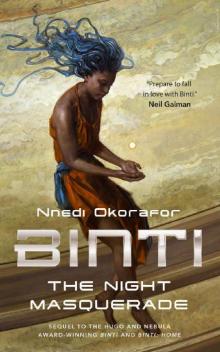 Binti: The Night Masquerade
Binti: The Night Masquerade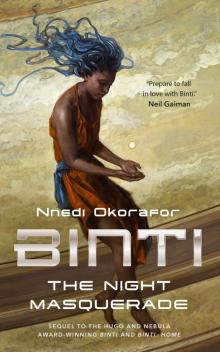 Binti--The Night Masquerade
Binti--The Night Masquerade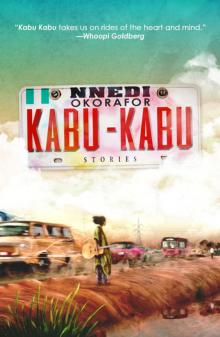 Kabu Kabu
Kabu Kabu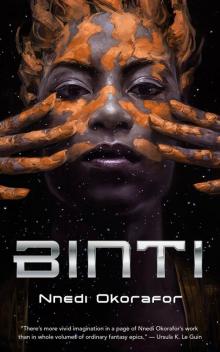 Binti
Binti Zahrah the Windseeker
Zahrah the Windseeker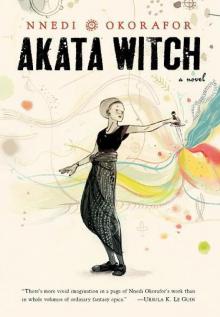 Akata Witch: A Novel
Akata Witch: A Novel Ikenga
Ikenga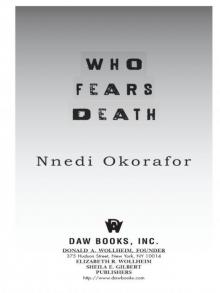 Who Fears Death
Who Fears Death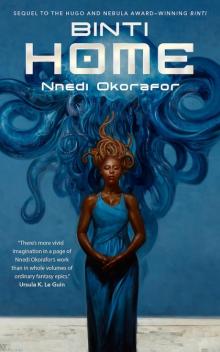 Binti--Home
Binti--Home Lagoon
Lagoon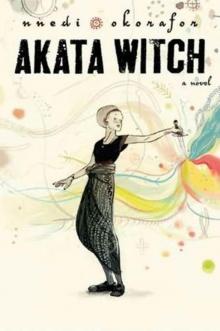 Akata Witch
Akata Witch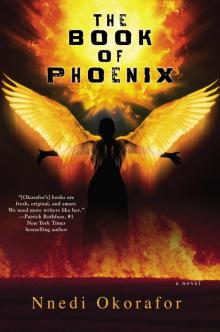 The Book of Phoenix
The Book of Phoenix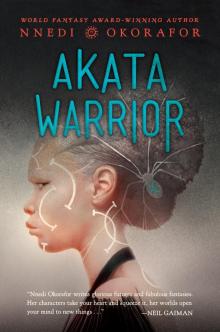 Akata Warrior
Akata Warrior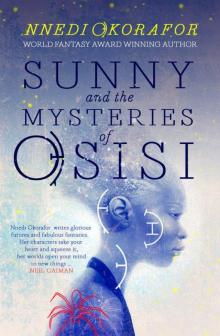 Sunny and the Mysteries of Osisi
Sunny and the Mysteries of Osisi